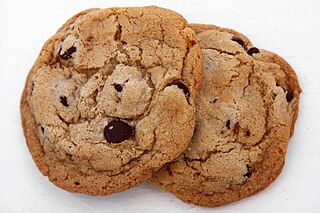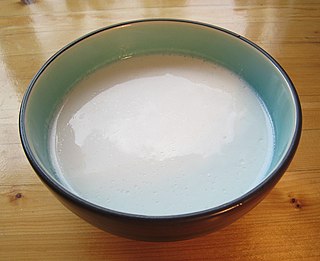Related Research Articles

The peanut, also known as the groundnut, goober (US), pindar (US) or monkey nut (UK), is a legume crop grown mainly for its edible seeds. It is widely grown in the tropics and subtropics, being important to both small and large commercial producers. It is classified as both a grain legume and, due to its high oil content, an oil crop. World annual production of shelled peanuts was 44 million tonnes in 2016, led by China with 38% of the world total. Atypically among legume crop plants, peanut pods develop underground (geocarpy) rather than above ground. With this characteristic in mind, the botanist Carl Linnaeus gave peanuts the specific epithet hypogaea, which means "under the earth".

A chocolate chip cookie is a drop cookie that features chocolate chips or chocolate morsels as its distinguishing ingredient. Chocolate chip cookies originated in the United States around 1938, when Ruth Graves Wakefield chopped up a Nestlé semi-sweet chocolate bar and added the chopped chocolate to a cookie recipe.

Peanut butter is a food paste or spread made from ground, dry-roasted peanuts. It commonly contains additional ingredients that modify the taste or texture, such as salt, sweeteners, or emulsifiers. Peanut butter is consumed in many countries. The United States is a leading exporter of peanut butter and one of the largest consumers of peanut butter annually per capita. January 24 is National Peanut Butter Day in the United States.

M&M's are multi-colored button-shaped chocolates, each of which has the letter "m" printed in lower case in white on one side, consisting of a candy shell surrounding a filling which varies depending upon the variety of M&M's. The original candy has a semi-sweet chocolate filling which, upon introduction of other variations, was branded as the "plain, normal" variety. Peanut M&M's, which feature a peanut coated in milk chocolate, and finally a candy shell, were the first variation to be introduced, and they remain a regular variety. Numerous other variations have been introduced, some of which are regular widespread varieties while others are limited in duration or geographic availability. M&M's are the flagship product of the Mars Wrigley Confectionery division of Mars, Incorporated.

The J. M. Smucker Company, also known as Smucker, is an American manufacturer of food and beverage products.Headquartered in Orrville, Ohio, the company was founded in 1897 as a maker of apple butter. J.M. Smucker currently has three major business units: consumer foods, pet foods, and coffee. Its flagship brand, Smucker's, produces fruit preserves, peanut butter, syrups, frozen crustless sandwiches, and ice cream toppings.

Conagra Brands, Inc. is an American consumer packaged goods holding company headquartered in Chicago, Illinois. Conagra makes and sells products under various brand names that are available in supermarkets, restaurants, and food service establishments. Based on its 2021 revenue, the company ranked 331st on the 2022 Fortune 500.

A product recall is a request from a manufacturer to return a product after the discovery of safety issues or product defects that might endanger the consumer or put the maker/seller at risk of legal action.
Butterfinger is a candy bar manufactured by the Ferrero SpA, a subsidiary of Ferrero. It consists of a layered crisp peanut butter core covered in chocolate. Invented by Otto Schnering of the Curtiss Candy Company in 1923, the name of the candy was chosen by a popularity contest. In its early years, it was promoted by Shirley Temple in the 1934 film Baby Take a Bow. Butterfinger was advertised by characters from an animated sketch series on Fox's The Tracey Ullman Show called The Simpsons beginning in 1988. The animated series became a smash hit for Fox, and its characters continued to represent the candy bar in commercial advertisements until 2001.
Most commonly known as CHOICE, the Australian Consumers' Association is an Australian not for profit consumer advocacy organisation. It is an independent membership based organisation founded in 1959 that researches and campaigns on behalf of Australian consumers. It is similar to the Consumers Union in the United States and Which? in the United Kingdom, who are considered sister organisations. It is the largest consumer organisation in Australia.

Reese's Take 5 is a candy bar that was released by The Hershey Company in December 2004. The original name of the candy bar was TAKE5 but common usage among consumers added a space. In June 2019, when the candy bar became part of the Reese's family, the name officially was changed to Reese's Take 5. The "5" in the name refers to the combination of five ingredients: chocolate, peanuts, caramel, peanut butter, and pretzels. This unique combination of ingredients earned Reese's Take 5 top honors in the 2019 LA Times official candy bar power rankings. On February 2, 2020, Hershey's announced the creation of the world's largest chocolate and nut candy bar with a 5,943 pound bar measuring 9 feet in length. The Take5 was known as Max 5 in Canada but has since been discontinued. Take5 has returned to Canada in the fall of 2020, under the name "Oh Henry Level Up".

Laura Clough Scudder was an entrepreneur in Monterey Park, California, who made and sold potato chips and pioneered their packaging in sealed bags to extend freshness.

Plant milk is a plant beverage with a color resembling that of milk. Plant milks are non-dairy beverages made from a water-based plant extract for flavoring and aroma. Plant milks are consumed as alternatives to milk, and often provide a creamy mouthfeel. There are about 17 different types of plant milks; almond, oat, soy, and coconut are the highest-selling worldwide. Production of plant-based milks, particularly soy and oat milks, can offer environmental advantages over animal milks in terms of greenhouse gas emissions, land and water use.
The Consumer Brands Association (CBA), formerly the Grocery Manufacturers Association (GMA), is a United States-wide trade association for manufacturers of consumer packaged goods (CPG).

Peanut sauce, satay sauce, bumbu kacang, sambal kacang, or pecel is an Indonesian sauce made from ground roasted or fried peanuts, widely used in Indonesian cuisine and many other dish throughout the world.

Ants on a log is a snack made by spreading peanut butter, cream cheese, ricotta cheese, or another spread on celery or bananas and placing raisins on top. The snack and its name is presumed to date to the 1950s, although made popular by Jayne Evans. The classic peanut butter version of ants on a log is recommended as a healthy snack by the McKinley Health Center at the University of Illinois at Urbana-Champaign. The fun name and simple flavors appeal to children.

Fruit preserves are preparations of fruits whose main preserving agent is sugar and sometimes acid, often stored in glass jars and used as a condiment or spread.

Peanut Corporation of America (PCA) was a peanut-processing business which is now defunct as a result of one of the most massive and lethal food-borne contamination events in U.S. history. PCA was founded in 1977 and initially run by Hugh Parnell, father of Stewart Parnell, with him and two other sons. The company was sold in 1994–1995 with the senior Parnell retiring, and with Stewart Parnell and others remaining with the new company as consultants. In 2000, control of PCA returned to Stewart Parnell via a private sale. Over this history, PCA came to operate processing facilities in Blakely, Georgia, Suffolk, Virginia, and Plainview, Texas, providing peanut and peanut butter products primarily to the "institutional food" market, to food manufacturers for use in cookies, snacks, ice cream, and dog treats, and to other markets.
Food safety in Australia concerns the production, distribution, preparation, and storage of food in Australia to prevent foodborne illness, also known as food safety. Food Standards Australia New Zealand is responsible for developing food standards for Australia and New Zealand.

Justin's is an American brand of natural and organic nut butters and peanut butter cups. The Boulder-based company manufactures and markets jars and single-serve squeeze packs of nut butter, along with various kinds of organic peanut butter cups. Justin's peanut butter cups are USDA-certified organic and use Rainforest Alliance Certified cocoa. Both the peanut butter cups and nut butters are distributed through stores such as Whole Foods Market, Sprouts Farmers Market, Starbucks, and Target in the United States.

Bega Cheese is an Australian diversified food company with manufacturing sites in New South Wales, Queensland and Victoria. Founded as an agricultural cooperative in the town of Bega, New South Wales by their dairy suppliers, it became a public company in 2011 when it listed on the Australian Securities Exchange. Close to half of shares publicly traded are still held by Bega's farmer-suppliers. It is currently one of the largest companies in the dairy sector in Australia, with a FY2018 base milk supply of approximately 750 million litres.
References
- 1 2 3 4 5 6 7 Sugarman, Carole (October 5, 1988). "THE 'PEANUT BUTTER GRANDMOTHER'". The Washington Post. Retrieved March 21, 2020.
- ↑ Boyce, Angie M. (2016). ""When Does It Stop Being Peanut Butter?": FDA Food Standards of Identity, Ruth Desmond, and the Shifting Politics of Consumer Activism, 1960s–1970s" (PDF). Technology and Culture. 57 (1): 54–79. doi:10.1353/tech.2016.0016.
- 1 2 Blitz, Matthew. "Why Midcentury Lawyers Spent 12 Years Arguing About Peanut Butter". Mental Floss. Retrieved March 21, 2020.
- 1 2 3 4 5 Clark, Krissy (October 27, 2017). "Meet Ruth Desmond, a concerned citizen who changed the face of food regulation". The Uncertain Hour (Podcast). Marketplace . Retrieved March 21, 2020.